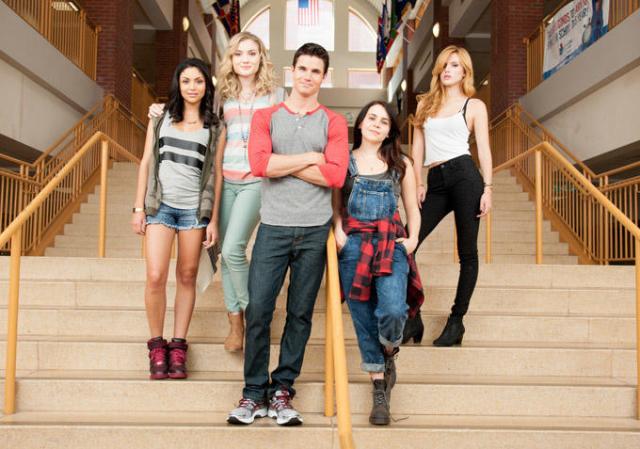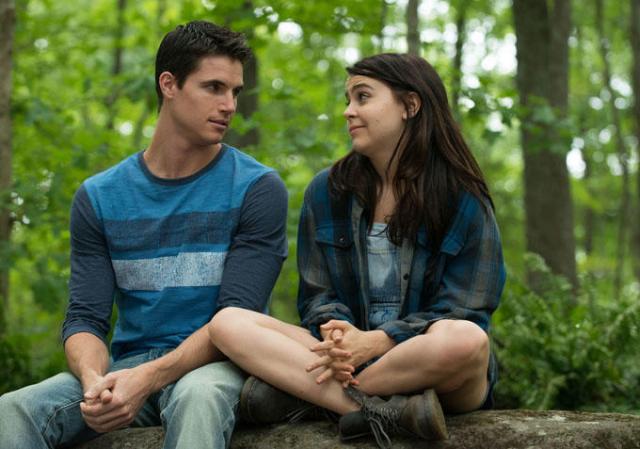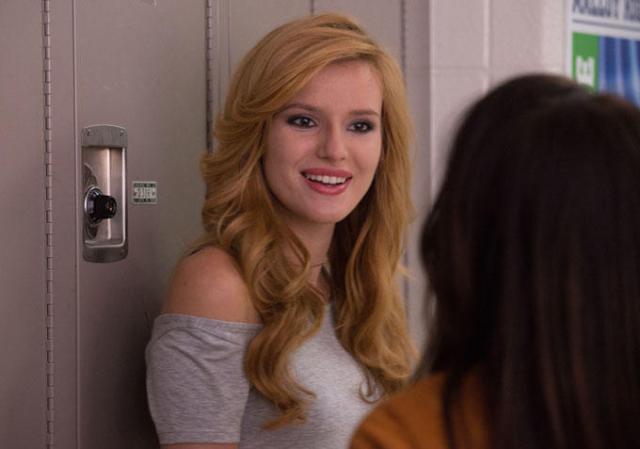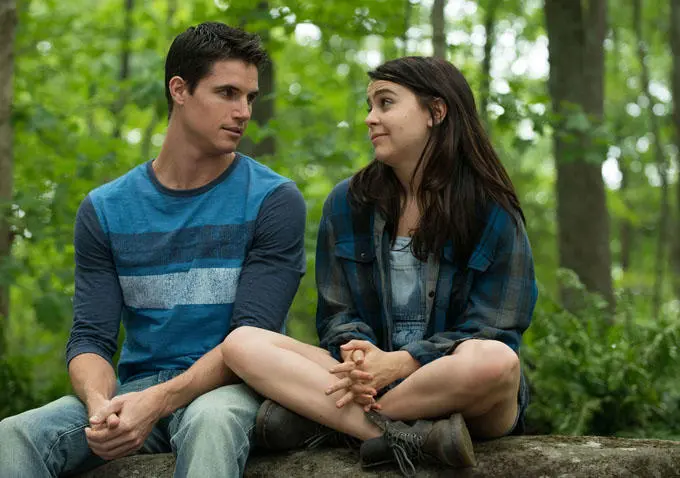The Duff firmly fits into the world of post-John Hughes teen comedies. And the older I get, the more I think Hughes influence was much larger than I ever knew. Ironic considering I literally I grew up in his hometown and went to his old high school. Literally, right off good old Shermer Rd. was a high school with the long driveway everyone saw in Ferris Bueller that had new faces dances for Freshman and Saturday detention for the bad kid. My terrible high school experience was literally in the school that created the stereotype in the movies, and — with the possible exception of Bayside — created the most disappointment about what high school would be like.
But by the time I was in high school, those Hughes movies felt more than a little “dated,” and even at 15 their problems were clear. For example, my love for Jake Ryan didn’t blind me to th fact that he was really one of the great villains for leaving his girlfriend to get molested. And the insane selfish entitlement of pretty much every character in Breakfast Club drove me nuts by the time I was their age. And as much as I appreciate some of the humor, Ferris really is a sociopath who should have gone to school. But even so, I know and have come to accept that Hughes movies will forever be the gold standard of teen movies.
And if there is one film by Hughes that is perhaps his most influential, it has to be Pretty in Pink. For whatever reason, the classic Cinderella/My Fair Lady stories always seem to be popular, no matter how sexist the story seems. After all, Hughes even rewrote the film with a guy in the role in the “better” Some Kind of Wonderful. And we’ve had Can’t Buy Me Love, She’s All That, Never Been Kissed, Drive Me Crazy, GBF and even Mean Girls. Now, Mean Girls might be a step above (thanks to some pretty good satire), but the make-over element is still there. The character realizes they are “uncool,” they want to become desirable and popular, but when they do they only to discover they are better off being themselves.
 The Duff isn’t really that different, with the exception of a slag term. From the very beginning I had my doubts that this term (“DUFF”) is as universally known as this film clearly wants it to be. I can forgive this because this continues a long tradition of movies suggesting that small secret languages among cliques are somehow universal. But if “DUFF” is, and you have sons who use the term, I suggest a weekend grounding. Because according to this film, DUFF stands for Designated Ugly Fat Friend, another way to disparage teenage girls.
The Duff isn’t really that different, with the exception of a slag term. From the very beginning I had my doubts that this term (“DUFF”) is as universally known as this film clearly wants it to be. I can forgive this because this continues a long tradition of movies suggesting that small secret languages among cliques are somehow universal. But if “DUFF” is, and you have sons who use the term, I suggest a weekend grounding. Because according to this film, DUFF stands for Designated Ugly Fat Friend, another way to disparage teenage girls.
Now we have to get over the big jump that that Mae Whitman’s Bianca is this person. They do enough in the film to make the adorable Whitman a tomboy compared to her model friends Casey and Jess (Bianca Santos and Skyler Samuels). But the bigger issue the film has to overcome is the “shock” Bianca has when her neighbor Wesley (Robbie Amell) calls her this to her face. Whitman plays the role from the very beginning of the film as an awkward ugly duckling who uses it as a defense mechanism. But the problem with The Duff is the claim the film makes – and the big leap you have to make to understand the social comment the film wants to make. Is the change in Bianca regarding realizing something about herself that others see her as? It may seem minor, but director Ari Sandel and writer Josh Cagan’s inability to figure it out is a major flaw in the film.
One thing the film doesn’t get wrong is casting Mae Whitman of Parenthood for the lead. She’s a naturally gifted comic actress, and is given opportunities to showcase that ability. I just wish she had slightly better material (the movie feels like it really needed a rewrite) and director to know how to tone down some of her performance when it calls for it. She also occasionally suffers from eyebrow acting, which takes away from the character’s realism. But when asked to go big, Whitman is remarkably strong, and she has good chemistry with most of her costars, especially with The Flash’s Amell, with whom she has great chemistry.
 In fact, they have so much chemistry that when the movie suggests there are other possibilities you can feel it struggle to convince the audience. For one thing, Whitman and Nick Eversman have no real chemistry. And while Bella Thorne is funny, Amell’s Wesley isn’t nearly shallow enough to be believably into her queen bee Madison. Madison rule of the school is problematic because while the film spends so much time attempting to break away from some stereotypes — the jocks aren’t idiots, the pretty girls aren’t brainless, and there aren’t many “nerds” — that having the girl who everyone hates but still follows doesn’t make much sense. She isn’t even quietly manipulative and cruel — she’s right up front with it, and even the teachers seem well aware of this. Why keep this stereotype without adjusting it to fit the world of the movie? I have no idea, unless the filmmakers feel it’s just funnier to see a pretty girl being cruel right out in the open. It certainly seems like a joke which hurts the film.
In fact, they have so much chemistry that when the movie suggests there are other possibilities you can feel it struggle to convince the audience. For one thing, Whitman and Nick Eversman have no real chemistry. And while Bella Thorne is funny, Amell’s Wesley isn’t nearly shallow enough to be believably into her queen bee Madison. Madison rule of the school is problematic because while the film spends so much time attempting to break away from some stereotypes — the jocks aren’t idiots, the pretty girls aren’t brainless, and there aren’t many “nerds” — that having the girl who everyone hates but still follows doesn’t make much sense. She isn’t even quietly manipulative and cruel — she’s right up front with it, and even the teachers seem well aware of this. Why keep this stereotype without adjusting it to fit the world of the movie? I have no idea, unless the filmmakers feel it’s just funnier to see a pretty girl being cruel right out in the open. It certainly seems like a joke which hurts the film.
 Oddly, when the movie goes for the expected joke, it usually falls flat. I don’t really find Ken Jeong’s “Asian man” joke funny, and I find he is far more entertaining when he’s subtle than when he goes big. I also found myself wishing Chris Wylde had been left out to give Romany Malco even two decent scenes. In simple dialogue, Whitman and Amell are very funny, especially a genuinely cute kissing scene. But then the film goes back to the gimmick of this DUFF concept, that ultimately detracts from the film’s many positive merits.
Oddly, when the movie goes for the expected joke, it usually falls flat. I don’t really find Ken Jeong’s “Asian man” joke funny, and I find he is far more entertaining when he’s subtle than when he goes big. I also found myself wishing Chris Wylde had been left out to give Romany Malco even two decent scenes. In simple dialogue, Whitman and Amell are very funny, especially a genuinely cute kissing scene. But then the film goes back to the gimmick of this DUFF concept, that ultimately detracts from the film’s many positive merits.
So why am I a little tentative about recommending this movie? Well, for one, as a teen movie based on personalized young adult novel, there is something hollow in the film which makes it feel that the writer and director don’t understand their main characters. I don’t want to say choosing women would have been better, but the movie needs to have a far more personal touch to avoid being cruel. Its the difference between Freaks and Geek’s singular Lindsay Weir and the type that Joey Potter represented in Dawson’s Creek. But it is also problematic because this movie is meant as a “teen” movie, which like Disney and Nickelodeon shows, will attract pre-teens. So I have to consider what the bigger issues the film tackles. And in this way, the film falls flat because it fails to bring anything new to the table, despite clearly wanting to be a new take on the Pretty in Pink cliche. And yet, it is certainly an improvement on that story, even if we’re still in a world where the girl still needs to get the boy the end.
(Images via Lionsgate, CBS Films)
Are you following The Mary Sue on Twitter, Facebook, Tumblr, Pinterest, & Google +?









Published: Feb 22, 2015 11:00 am